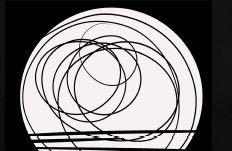
Art Project 2015
General outline
The artistic proposal XÀBIA CSE-2015 is a collage, a very bold conceptual performance. The central theme is the sixties with all their historical complexity: the Berlin Wall, the hippie movement, the arrival on the moon, the process of decolonization, May 68, the Beatles, the Rolling Stones ... However, it is not a nostalgic trip. We are not only interested in what those years were like but what remains today of the past decade, their dreams, desires, and struggles...
In order to understand that, it is essential to get to know the past. What is the relationship between the creation of the Berlin Wall in 1961 and the today's borders? In 1969 the first man on the moon crossed the boundary that seemed impossible. How do we perceive boundaries today?
"Yesterday?", then, is a work of art which includes both past and contemporary music, dance and theatre, poetry recitation and film projections, orchestra and rock bands, a soprano singer and rappers, a choir of 1,500 singers ...This shows the complexity and richness of our world and our lives.
Lyrics
The CSE has asked several writers to create texts that would represent dreams, reflections, achievements and contradictions of that decade. Each writer focuses on one particular year and subject. Hence, we have very rich and varied texts: poems, stories, theatre, rap...
It is our pleasure to bring the current literature into the limelight and present it to all the teachers and students that participate in this year's meeting.
We have been working with many extraordinary writers:
Anna Montero: 1961. Construction of the Berlin Wall. A reflection on the borders.
CSE: 1962 marks the end of the Algerian war. A reflection on violence.
Manel Rodríguez-Castelló: 1963 March on Washington for jobs and freedom. A reflection on freedom.
Carlos Durà: 1965. Closure of the Second Vatican Council. A reflection on faith.
Emilio Encabo: 1966 Liberation of Nazi Albert Speer after serving a 20-year-long sentence in prison. A reflection on forgiveness.
Begonya Mezquita: 1968. May 68. A reflection on youth.
Alexis Sellés "Klei": 1969 Apollo XI. A reflection on the boundaries.
Vicente Roncero: 1970. Ending of The Beatles. A reflection on art.
Music
The music also serves to reflect the desire to be conceptual and complex. The sixties were very rich and diverse musically. It is enough to think of the Beatles at the beginning and end of their career. The musical project of CSE is a reflection of the vision of the open and broad -minded sixties. There are two main parts of the performance: firstly, some years are represented with their unique music pieces (61, 62, 63, 65, 66, 68, 69, 70) and secondly, the music of The Beatles accompanies us throughout the years 64, 67 and the final mix.
New music: is comprised by pieces composed especially for the event. Each year has a different musical overtone. 1961 is a magnificent slightly dark piece, 1962 takes us into tribal and Mediterranean music with folk-pop; 1963 lands us at the rally in Washington, 1965 leads us to greatness and depth of the human being, the Greek choir will make us participate and reflect upon the event of the 1966; we attend the madness of the psychedelic excesses of May 68 to pass a futuristic rap in 69, which leads to the final collage of 1970, where basic pop melodies of the sixties meet.
Music of The Beatles: we have known for quite some time that students today do not know much about this important English group so we have decided to present their music. It also serves as a framing device throughout the performance because it had its beginning and end during this decade. With the three medleys, we will listen to 16 essential songs: Let it be, I saw her standing there, Help, From me to you, A Hard Day's Night, She loves you, Hey Jude, etc. ...
Dance
With dance we can illustrate all the above-mentioned events to the audience. In 1961, the ballet represents life in the city before the construction of the wall. It presents general daily activities true to any time. Gradually, the dancers show dehumanizing barriers constructed during that time. In 1962, African tribal dance steps mix with feelings and drama of the story being narrated. The ballet does not literally follow the historical events but the context in which they were happening. In 1963, ballet is involved only in the prelude, representing the persecution of black people. In 1968 we start to create real images of the student revolution, transforming them into dance. In 1969, the ballet accompanies the lyrical rapper. In 1970, the ballet joins the rest of the performing groups, to show a theatrical collage.
Theatre
The theatre also has an important role in the artistic project XÀBIA-2015. Rhapsodists will have to produce a dramatized reading of the lyrics of musical pieces in 1961 and 1970. 1962 will be narrated and accompanied by the music band. The story will be read out loud by a retired teacher from the town of Xàbia. And in 1966 will be presented as a real theatrical scene with five characters: A, B, C, D and the CSE choir as a fifth character. The Greek choir will represent the power of people, the voice of the unprivileged street talking to other characters.





